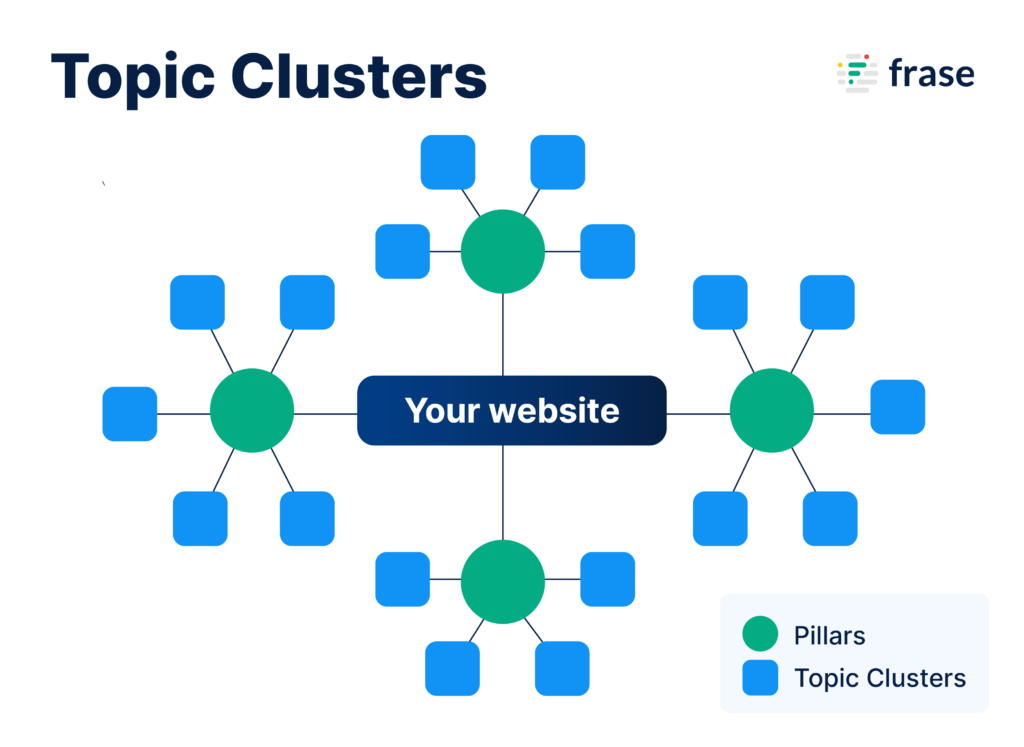Topic Clusters – A Powerful SEO Weapon in 2023 and Beyond
In the digital era, a deep understanding of SEO tactics has become essential for all those looking to improve their ranking in search engines. If you want to show that your site has more relevant and compelling content, then that's why you should leverage topic clusters.
It is one of the most popular SEO strategies lately.
This topic cluster model was first introduced by HubSpot back in 2017.
And since then, this interlinking tactic of the content has become one of the most effective ways of boosting a webpage's SEO.
That's also because Google doesn't just look for keywords when determining rankings.
It looks for synonyms, answers, subtopics, related keywords, and all the questions your target audience has when researching a specific industry.
Why Are Topic Clusters More Important Than One Piece of Content?
First things first…
A topic cluster is a group of quality content pieces around a core topic.
A topic cluster content strategy aims to build an interconnected website architecture that helps search engines understand the relationships between your content clusters.

This can help you rank for multiple keyword phrases related to one main topic.
After all, there are some topics you could never address them fully with a single web page of web content.
Moreover, if you create too many pieces of content around one single core topic, you may even go to keyword cannibalization, forcing your pages to compete with each other to rank on the SERPs.
But it's not only about the search engine – it's also about your visitors.
A topic cluster with many backlinks will cement your topical authority in that industry- strengthening your brand.
It will provide a better user experience to your audience, fulfill their search intent, keep them on your site for longer, and even push them to come back to your pillar pages for more information.
It's worth pointing out that Google has never explicitly mentioned using clusters.
However, there's this comment from Google's Webmaster Guidelines:
“Design your site to have a clear conceptual page hierarchy.”
… Which has made SEOs come up with the framework of topic clusters.
How to Unlock the Full SEO's Potential with Topic Clusters
Since many different articles are showing you how to create and build your topic clusters, we are focusing more on some tips that will help take your content marketing strategy to the next level.
1. Use Autocomplete or Focus on Researching Keywords
If you want search engines and visitors to easily discover your website, you need to build your content and pages around a single question or topic.
The idea here is to try and figure out what users are looking for so that you can also come up with evergreen content and do the internal linking among the web pages well.
The most basic way to get ideas?
Go to the Google search bar, type something, and see what else people are searching for about your pillar content.
That will give you some general and more specific content ideas on how to structure your content.
You can also use your favorite keyword research tool so you can come up with ideas, synonyms, questions, or potential target keywords for your cluster content.
2. Conduct a Content Audit Every Once in a While
As you produce more content, it's important to keep an eye on how your topic cluster strategy is working.
To optimize your content, you can use Audiit.io, another tool of your choosing, or you can hire freelancers on Legiit.com to create topic clusters and make internal links.

A content cluster audit every can help you determine what's working, what's not, and where you might need to change your SEO strategy.
Plus, it can give you some great ideas for new content clusters.
Here are a few things to look for when you're conducting a content cluster audit:
– How well is each piece of content performing?
– Is there any content that isn't performing well that could be improved?
– Are there any gaps in your content strategy?
– What new topics could you add to your existing topic clusters?
– Are there any existing topic clusters that could be expanded?
– What about your competitors?
3. Update Your Pre-Existing Content
As you develop a topic cluster strategy, take a look at the content you already have.
You probably need new and more relevant content, or maybe you can simply refresh your old blog posts/articles so they fit into your new marketing strategy.
For example, you could update them with new information and target different keyword clusters.
If that's not an option anymore, getting rid of outdated or contradictory content will be a necessary task.
These pieces of content clusters tend to occupy unnecessary space and ruin the credibility of your interlinked web pages.
Sometimes just by making these tweaks, you can quickly and easily improve your SEO.
4. Leverage the Power of Interlinking
As mentioned before, the goal of topic clusters is to have several pieces of content support the central topic while being interconnected.
Your cluster topics can only reach their full potential if everything is expertly related.
When you start grouping your content, you present users with an organized list of blog pages, topic clusters, content clusters, and/or site categories.
This way, your website will be more user-friendly and easier for search engines to crawl.
Add internal links in each pillar page pointing to the relevant blog post.
As a bonus, this strategy helps you rank for multiple long-tail keywords related to your broad topic.
Final Words
In conclusion, topic clusters are an extremely powerful SEO tool that can help you rank higher in search engine results pages, drive more organic traffic to your website, and improve your overall online visibility.
If you're not already using this search engine optimization strategy, now is the time to start!





